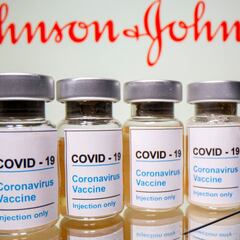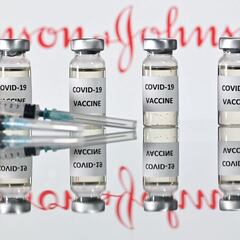Pfizer, Moderna and J&J/Janssen: who can get each, side effects, doses
There are currently three vaccines that have been approved for use in the US, that have been shown to be highly effective against the covid-19 virus. What to know about each one.

President Joe Biden has said that vaccination will be open to all Americans by 19 April. However, depending on where you live you might have access to only one of the three vaccines. Health officials say to get whichever vaccine is available to you. Getting vaccinated doesn’t just help you but everyone around you.
The Pfizer-BioNTech, the Moderna and Johnson & Johnson Janssen covid-19 vaccines have been given emergency approval for use in the US. However, use of the Johnson & Johnson has been suspended temporarily to study 6 severe cases of blood clotting.
- How many J&J vaccines have been administered in the US?
- J&J vaccine side effects: how many blood clot cases in US?
- What to do if you get covid-19 between vaccine doses?
- Which US states are vaccinating the fastest?
- How long does the Moderna vaccine last?
- AstraZeneca vaccine trials in children halted
- Where and when you can get your vaccine in the US
Why you should get vaccinated
Getting vaccinated doesn’t just help you from getting sick, it also helps protect everyone around you. It keeps you from becoming a vector of transmission to your family, friends and the community at large. It also helps to reduce the chance that the virus can mutate into a new variant that could possibly get around the immunity incurred by the vaccine.
Currently the three vaccines available seem to be able to protect those that have been vaccinated against the new variants of covid-19 present in the US. The three that health officials are watching closely are the Brazil variant, the South Africa variant and the UK (Kent) variant which is now the dominate strain in the US.
If enough people get vaccinated the community can reach what is known as “herd immunity” where the virus can’t spread freely through the population. There are people who cannot get vaccinated due to immune deficiencies or severe allergic reactions, by creating herd immunity it provides protection to these people. Although the exact percentage of people inoculated needed to reach herd immunity for coivd-19 is not known at this time, health officials calculate that between 70 and 90 percent of the population would be needed.
Who shouldn’t get vaccinated
People who have an immediate allergic reaction or a severe allergic reaction (anaphylaxis), even if it wasn’t immediate, should not get the vaccine. An allergic reaction is considered severe when a person needs to be treated with epinephrine, also know as an EpiPen, or if that person must be hospitalized due to the reaction. An immediate reaction is one that occurs within 4 hours of receiving the vaccination shot. Symptoms can include hives, swelling, or difficulty breathing.
None of the three covid-19 vaccines have eggs, preservatives, latex in them, a full list of ingredients can be consulted for each vaccine.
Our CEO, @AlbertBourla sharing #Covid19 vaccine manufacturing updates from our Kalamazoo, Michigan site after @POTUS stopped by. #ScienceWillWin cc:@WHCOVIDResponse Watch here 👇 pic.twitter.com/BNRFhAsTUS
— Pfizer Inc. (@pfizer) February 19, 2021
Pfizer-BioNTech covid-19 vaccine
The Pfizer-BioNTech was the first vaccine to get emergency approval for use in the US. It is an mRNA vaccine, which teaches the cells how to make a harmless “spike protein” that will trigger an immune response to the virus. Unlike many other vaccines which put a weakened or inactivated germ into the body.
You should not get the Pfizer vaccine if you are allergic to substances such as polyethylene glycol. Here is a full List of Ingredients.
The Pfizer vaccine has been tested to be 95% effective at preventing covid-19 in people without evidence of previous infection. Currently, it is the only vaccine available in the US that is recommended for use by people 16 and older. It is a two-dose vaccine, each dose should be taken 21 days apart, however CDC says that the second dose can be administered up to 42 days after the first. The jabs are given in the upper arm.
Pfizer-BioNTech covid-19 vaccine side effects
During clinical trials for the Pfizer covid-19 vaccine side effects were common but mostly mild to moderate. However, a small number of people had severe side effects, which are defined as affecting a person’s ability to do daily activities.
Common side effects include pain, redness and swelling in the vicinity of where the vaccine was injected. Throughout the body people have experienced chills, fever, tiredness, headache, muscle pain and nausea.
These side effects usually start within a day or two of getting the vaccine. Side effects might affect your ability to do daily activities, but they should go away in a few days.
Happening now: Our CEO, Stéphane Bancel, is delivering introduction remarks at #ModernaVaccinesDay. #mRNA is an information molecule and we believe that this changes everything. pic.twitter.com/5s4sG9ubl9
— Moderna (@moderna_tx) April 14, 2021
Moderna covid-19 vaccine
The Moderna is an mRNA vaccine, which teaches the cells how to make a harmless “spike protein” that will trigger an immune response to the virus. Unlike many other vaccines which put a weakened or inactivated germ into the body.
You should not get the Moderna vaccine if you are allergic to substances such as polyethylene glycol. Here is a full List of Ingredients.
The Moderna vaccine has been tested to be 94.1% effective at preventing covid-19 in people without evidence of previous infection. It is recommended for use by people 18 and older. It is a two-dose vaccine, each dose should be taken 28 days apart, however CDC says that the second dose can be administered up to 42 days after the first. The jabs are given in the upper arm.
Moderna covid-19 vaccine side effects
During clinical trials for the Moderna covid-19 vaccine side effects were common but mostly mild to moderate. However, a small number of people had severe side effects, which are defined as affecting a person’s ability to do daily activities.
Common side effects include pain, redness and swelling in the vicinity of where the vaccine was injected. Throughout the body people have experienced chills, fever, tiredness, headache, muscle pain and nausea.
These side effects usually start within a day or two of getting the vaccine. Side effects might affect your ability to do daily activities, but they should go away in a few days.
Johnson & Johnson is proud to support the @IFPMA #TeamVaccines campaign, which aims to educate and increase confidence in #COVID19 vaccines. Learn more: https://t.co/KLtmYnpBaT pic.twitter.com/qqgAuyACNp
— Johnson & Johnson (@JNJNews) March 26, 2021
Johnson & Johnson’s Janssen covid-19 vaccine
Almost 7 million doses of the Johnson & Johnson covid-19 vaccine have been administered, but use of the Johnson & Johnson covid-19 vaccine was suspended to study 6 severe cases of blood clotting. All the cases were in women between the ages of 18 and 48.
The Johnson & Johnson covid-19 vaccine is a one-dose vaccine and has advantages over the other two covid-19 vaccines that have been approved in that it doesn't need to be stored at extremely low temperatures, but can be kept in a refrigerator. This allows it to be distributed to more remote areas that don’t have the equipment necessary to maintain the extreme cold needed to preserve the Pfizer covid-19 vaccine for example.
The Johnson & Johnson is a viral vector vaccine, which is a modified version of a different virus which teaches the cells how to make a harmless “spike protein” that will trigger an immune response to the virus.
You should not get the Johnson & Johnson vaccine if you are allergic to substances such as polysorbate. Here is a full List of Ingredients
The Johnson & Johnson vaccine has been tested to be 66.3% effective at preventing covid-19 in people without evidence of previous infection. It is recommended for use by people 18 and older. The jabs are given in the upper arm.
Johnson & Johnson covid-19 vaccine side effects
During clinical trials for the Johnson & Johnson covid-19 vaccine side effects were common but mostly mild to moderate. However, a small number of people had severe side effects, which are defined as affecting a person’s ability to do daily activities. Side effects were more common in people 18–59 years old compared to people 60 years and older.
Related stories

How many Johnson & Johnson vaccines have been administered in the US?

J&J vaccine side effect: how many people have notified of blood clots in US?
Common side effects include pain, redness and swelling in the vicinity of where the vaccine was injected. Throughout the body people have experienced chills, fever, tiredness, headache, muscle pain and nausea.
These side effects usually start within a day or two of getting the vaccine. Side effects might affect your ability to do daily activities, but they should go away in a few days.
